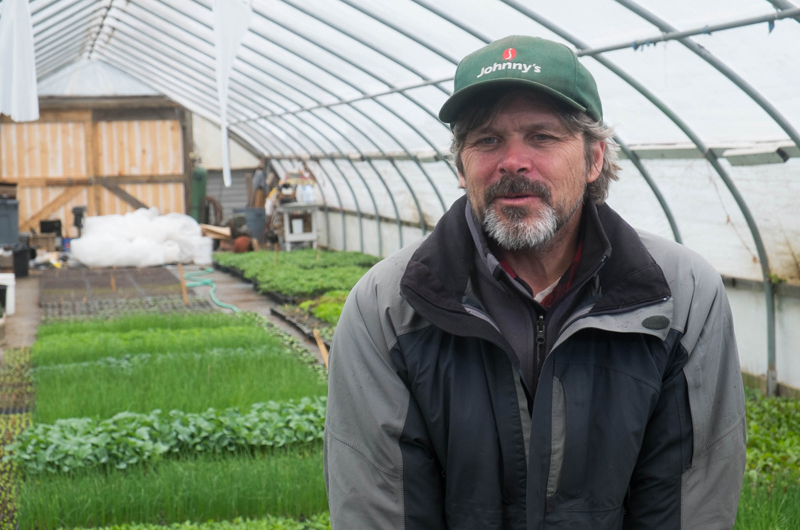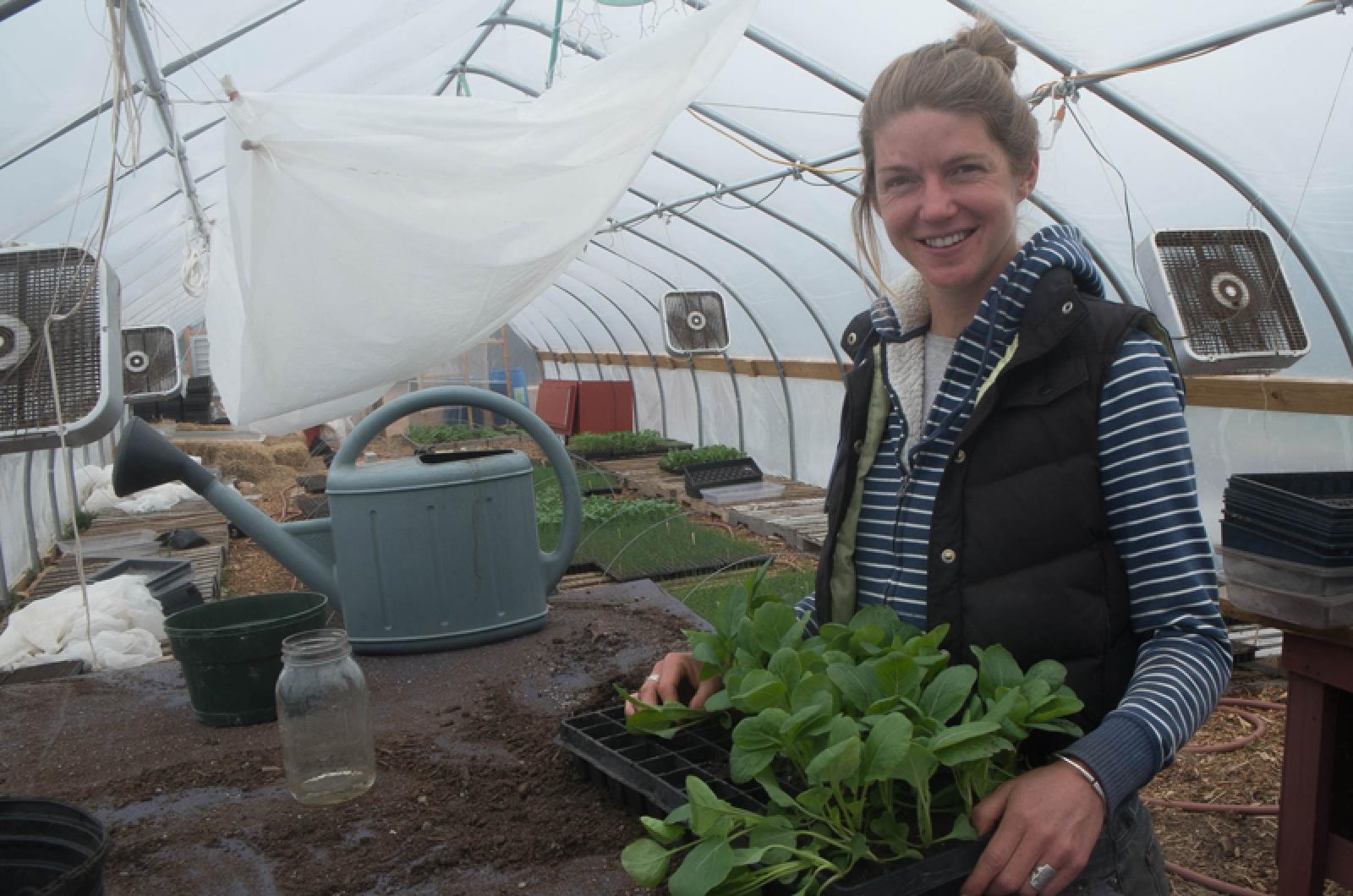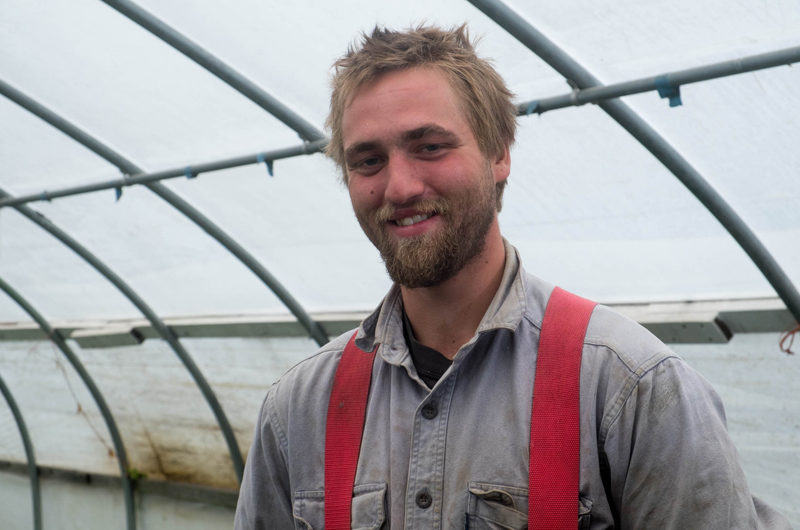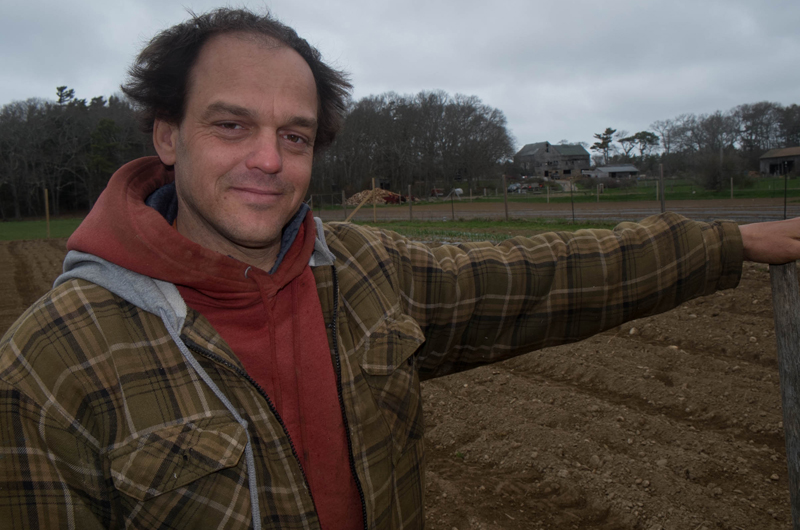Andrew Woodruff sold his first vegetable when he was 12 years old.
“It was extra lettuce from my garden. My father and I grew it and took it to the farmers’ market and sold it. This was in the seventies, right when the farmers’ market first started,” he said, standing in a light spring drizzle at Whippoorwill Farm in West Tisbury on Wednesday morning. Blue-eyed Mr. Woodruff, now 51 and bearded, was inside his 20-by-100 foot greenhouse among plug trays of herbs, chard, tomatoes, eggplant, kale and other vegetables. “We are surrounded by 25,000 onions right now,” he said.
Mr. Woodruff spent his childhood playing in the dirt on his father’s two-acre truck garden on State Road. He could drive a tractor before a car. He developed a fondness for farming early on. “I knew it was what I wanted to do for the rest of my life,” he said.
But there was a lot he didn’t know.

In the early 1980s, he devoted all his attention to farming. And in summers when he returned home from college, he and a friend, Joe Ferris of Waterville, Me., started farming on the Island. Together they built a greenhouse on the Woodruff family property. In a June 1982 edition of the Vineyard Gazette, 19-year-old Mr. Woodruff said he thought vegetable prices on the Island were “unnecessarily high.” Still, he said he could see himself working the garden plot for years to come.
Years later, when a piece of property on Old County Road in West Tisbury became available, Mr. Woodruff leased it. Soon after, the property went up for sale and he didn’t hesitate. “I bought it . . . this was before real estate prices went through the roof,” he said. Along with a crew of other farmers, he ran Whippoorwill Farm.
But farming still had many challenges.
It was expensive. In the spring, the farm had to borrow money in order to purchase seeds. They had to pay for labor and operating costs. Money didn’t make its way into the farm until after the harvest, and even then, profits from selling vegetables went directly back to the people the farm borrowed it from. Sometimes they had to pay interest, too.
So in 1994, when he was 31, Mr. Woodruff introduced Community Supported Agriculture (CSA) to Martha’s Vineyard. CSAs operate like this: a consumer pays a farmer upfront for a season’s worth of produce. Food is picked up weekly by the consumer from the farm. The farmer-managed marketing model means not being able to select specific vegetables but rather get a mixed bag of whatever the farmer grows. It benefits both the buyer and the farmer.
The CSA shared partnership is about risk, too. “Risk for everyone,” Mr. Woodruff said. Rather than worry about an uncertain season, consumers share the risk with the farmer.
“The concept came from an employee of the farm who heard about CSAs off-Island,” said Mr. Woodruff, The employee was Penny Griggs and she had told Mr. Woodruff about the success of CSAs in Vermont.
And while the CSA model was new to Martha’s Vineyard, it wasn’t new elsewhere in the United States. It was also becoming popular abroad. Mr. Woodruff’s first CSA was an 18-week program and cost shareholders $16 per week.
During that first year Whippoorwill sold 30 shares. In 1995, the farm sold 70. In its third year the shareholder number climbed to 100 and in the years that followed it kept climbing.
But it was a rollercoaster. “The highs are great and the lows are very low. We’ve seen two dry summers and a hurricane. It’s been hard on our crops,” Mr. Woodruff told the Gazette in 1996. Yet he remained hopeful for the following season, which was better.
In the years since, Whippoorwill has moved from Old County Road to the property now home to Thimble Farm and then back to Old County Road a few times. At Thimble, Mr. Woodruff had more land to make use of, so he sold more shares. One year he sold 600. Two years ago he returned to Old County Road. “I’m aiming to sell 200 shares this year. It’s quite a change, going from 600 at one point to 200,” he said. “But it’s a welcome change. I’m quite fine with it.” This year at Whippoorwill shareholders can choose how often they want to be part of the CSA. Prices range from five-week shares for $220 to large full-season shares for $895. By last month, Mr. Woodruff said the farm had sold 100 shares. “I’m halfway there for this year. It’s going to be a good year, I hope. For a CSA to function it’s important for people to sign up. It’s much easier for us to plan around a number.”
Today Mr. Woodruff is no longer the only farmer doing CSAs on the Vineyard, where a small farming renaissance has been under way for the past few years.
“A lot more people are farming on the Vineyard. Which brings more competition, but competition is healthy,” he said. “It means there is an appreciation for eating local. A lot more diversity on the Island. There are so many different types of farming. Food, animals, wool, people who make goat’s milk soap. Never in my life did I dream there would be so many different types of farms here.”
But being a seasonal community has its downfalls. “The challenge on the Vineyard for any seasonal business is that July and August are the big months. Farming is not really any different from jobs that make the bulk of their money then,” Mr. Woodruff said. “And land is becoming harder and harder to find. That’s a challenge for young farmers. There’s a limited supply of good farmland and because of this, farmers on the Island really need to work together as a community,” he said.
Mr. Woodruff leases part of Whippoorwill to 22-year-old Gideon Spykman, who started a chicken CSA program last year. The operation is called Back 40 Farm.
Mr. Spykman began farming on the Island when he was 17. For four years he worked at Morning Glory Farm. After that he spent a summer at North Tabor Farm and a summer at Black Water Farm. He met flower farmer and current owner of Tea Lane Farm Krishana Collins, who introduced him to Mr. Woodruff. “Andrew rolled up on a tractor one day and I told him I wanted to do tractor work. He set me up on his farm and I saw potential for land that could be used for poultry.” The two farmers talked and worked out a deal.
“It’s been good,” said Mr. Woodruff.
Back 40 Farm’s CSA sold 30 shares last year. Mr. Spykman’s goal is to sell 50 this year. “So far we’ve sold 10,” he said. He coordinates his pickups with Mr. Woodruff. “Fridays people pick them up,” he said. His shares include a “three-and-a-half-plus pound” Island-raised chicken a week, starting at $42 for two weeks. The largest share is the eight-week share, which costs $163.
Slip Away Farm owner Lily Walter runs the only production farm on Chappaquiddick. Three years ago, under guidance and moral support form Mr. Woodruff, she was able to start a CSA for residents on Chappy. “Andrew is my farming hero. He taught me a lot. I’ve always thought CSAs made a lot of sense for both the consumer and the farmer,” she said. Shares from Slip Away range from an 11-week share for $365 to a 20-week share at a little over $1,000, Ms. Walter said. Everyone pays up front and picks up their share at her farm. “There aren’t too many places on Chappy to gather,” she said, “besides the community center, but that holds more formal events. There isn’t any casual drop-in center and this CSA pickup has sort of become that. I really like it.”
And for those who are less interested in a mixed bag of vegetables of the farmers’ choosing, there’s Ghost Island Farm.
Rusty Gordon worked on Whippoorwill Farm for many years before starting his own farm, Ghost Island, at the site of Nip ’n’ Tuck Farm in West Tisbury. “The problem with CSA shares is not getting to pick what you want,” he said. As a result, Ghost Island offers a twist on the old CSA model. “I call it a co-op, to distinguish myself from Andrew,” Mr. Gordon said. The co-op shares work like credit. Before the season starts, consumers pay money up front, which acts as a credit at the farm. An added benefit is Mr. Gordon discounts anything shareholders purchase from the farm stand 10 per cent. “People like it,” he said. Last year the farm sold 100 co-op memberships, and this year Mr. Gordon aims to double the number. “Everything is really fresh and you don’t have to get your food once a week. You can come get your food whenever you want,” he said.
In 2010, the Farm Institute ended its vegetable CSA and started a meat shareholder program. “There’s no risk to this, the risk already happened” said Jon Previant, executive director of the nonprofit, educational farm. “We’ve tried not to call our meat program a CSA because the nature of raising meat — lamb, chicken, beef, pork — is different from vegetable farming. For us, being primarily beef producers and lamb producers, our production cycle is much longer,” he said, adding: “On Martha’s Vineyard, I think you’re seeing a couple different models that all apply successfully. The important part is the community has a deep involvement in their relationship with the farmer whether it’s vegetables or meat.”
Prepaying isn’t required, but the farm gives a discount for those who choose to prepay. “We charge $270 for three months if you prepay, if you don’t, it’s $300 for three months,” said Lindsay Minor marketing and special events director at the farm. So far, the Farm Institute has 14 shareholders. “We are also doing deliveries to people’s houses or a common area in town where people lived,” she said.
And while prepaying for Island-grown food is what kick starts the cash flow and anchors the different share systems, different farmers continue to do it for many reasons, all of which touch on the fact that they still find satisfaction in the old trade.
“Farming today is more than just animals and vegetables,” said Mr. Spykman. “When you’re a farmer you’re an avid mechanic, a carpenter and a businessman. And you have to be good about switching them. And you may not wear them all well, but you wear them all.”
So what is the future of CSAs on Martha’s Vineyard?
“I want to be doing this for another 10 years, until I’m 60,” Mr. Woodruff replied. “But the future? The future is with the young farmers, farmers like Lily Walter and Gideon. A younger and more energetic generation, that’s our future.”







Comments (3)
Comments
Comment policy »